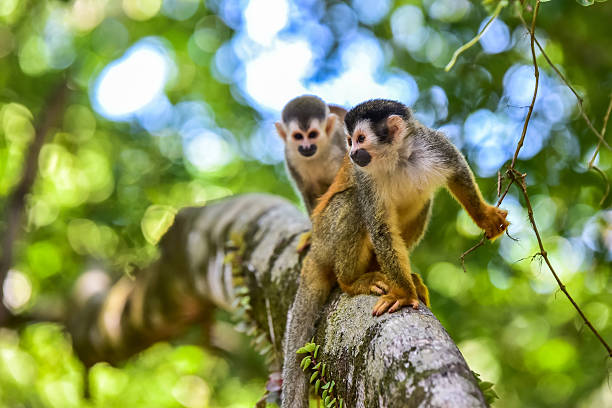Squirrel Monkeys: The Ever-Adaptable Rainforest Dwellers
Squirrel monkeys, though often overlooked in favor of their larger primate cousins, play a crucial role in their ecosystems. As adaptable rainforest dwellers, they provide important insights into the complexities of biodiversity and habitat conservation.

The Origins of Squirrel Monkeys
Squirrel monkeys, belonging to the genus Saimiri, are native to the tropical forests of Central and South America. Their name derives from their agile, squirrel-like movements in the treetops. Historically, these monkeys play a significant role in the mythology and folklore of indigenous cultures. They are often depicted as symbols of playfulness and cunning, reflecting their lively and curious nature.
The Characteristics of Squirrel Monkeys
Weighing only around 1 to 2 kilograms, squirrel monkeys are among the smallest of the primates. They are recognized by their short, soft fur, which is olive or grayish in color, and their white faces marked with a black muzzle. Their long, semi-prehensile tails, almost twice the length of their bodies, are used for balance when navigating through the tree canopy.
The Lifestyle of Squirrel Monkeys
Squirrel monkeys are diurnal animals, meaning they are active during the day and sleep at night. They live in large groups, sometimes numbering over 500 individuals, and their social structure is female-dominant. Their diet is omnivorous, consisting mainly of fruits and insects, but occasionally includes small vertebrates.
Current Conservation Status of Squirrel Monkeys
Although squirrel monkeys are not currently endangered, their population is decreasing because of habitat loss and illegal pet trade. The International Union for Conservation of Nature (IUCN) lists the Central American squirrel monkey as Vulnerable, while the Black squirrel monkey is considered Near Threatened.
The Role of Squirrel Monkeys in Scientific Research
Squirrel monkeys have been used extensively in biomedical research due to their close genetic relationship to humans. They have significantly contributed to our understanding of sensory functions, infectious diseases, and behavioral science. However, ethical considerations have led to a decline in their use in laboratory experiments in recent years.
The Economic Impact of Squirrel Monkeys
Squirrel monkeys play a crucial role in ecotourism, particularly in Costa Rica, where tourists flock to national parks to catch a glimpse of these charismatic creatures. Nevertheless, it’s crucial to ensure that tourism practices are sustainable and do not disrupt the monkeys’ natural behaviors or habitat.
In conclusion, squirrel monkeys, with their adaptability, fascinating social structures, and unique ecological roles, offer a wealth of opportunities for exploration and study. As we strive to conserve their populations and habitats, we also stand to learn valuable lessons about biodiversity and the intricate interconnectedness of life on Earth.




